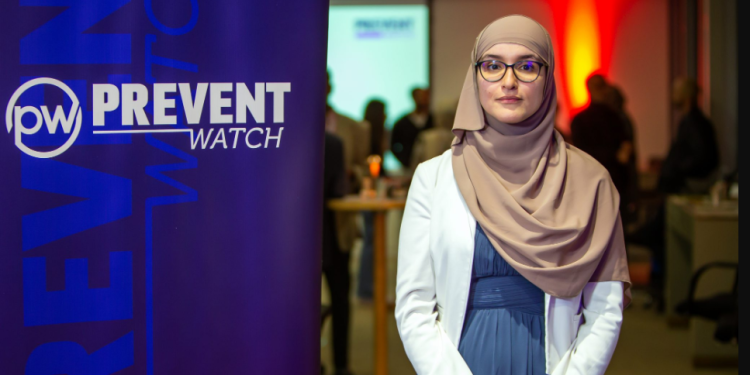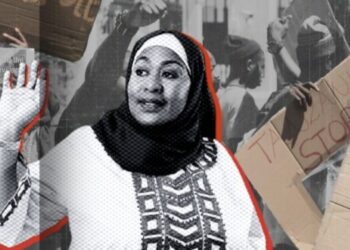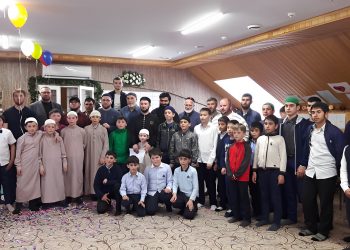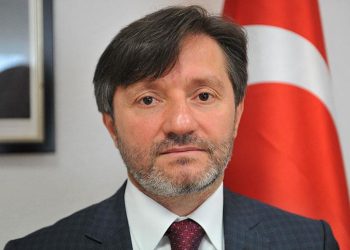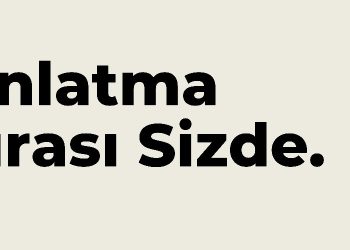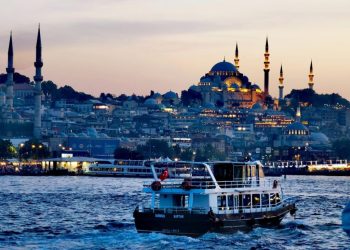This interview was conducted by Muhammed Hüseyin Ergören on behalf of the Bulletin of Intellectual Streams in the Muslim World.
-What is the “prevent strategy” and what does it aim for?
-The aim of Prevent on paper is to prevent people from being drawn vulnerable into terrorism which is a noble mission. Nobody can say don’t stop people from being drawn into terrorism if you can stop something before that would be better than taking action afterward. That’s what the objective is on paper but Prevent is one of the four parts of the UK’s counter-terrorism strategy. There is a counter-terrorism strategy called “contest” and it has three parts that a bit more tangible and prevent is the fourth part which is the idea that you can stop someone before they’ve committed the act or before even they thought of committing the act. You wouldn’t even know but I can say to you in 10 years or 20 years based on what you think, I believe right now you are at risk of becoming a terrorist in the future. That’s the idea that Prevent is based on.
-What are the roots of Prevent and when did they decide to implement this policy?
It came about in 2003 but they didn’t implement it until after the 7/7 bombings, so it was in 2006. In 2006 they ruled out as a policy it wasn’t mandatory, and it wasn’t statutory to report people to prevent until 2015. Before 2015, it was a policy to give funding to mosques to community centers and encourage people to look out for people who might be vulnerable to radicalization.
-So, was it much more to integrate people into society?
-Initially, when the Labour government was in power in 2006, it tried to kind of put it under the banner of cohesion and integration, so they muddled up the language. Maybe, they also muddled up a bit in practice. However, it was not just about integration. It was about people who are different. The idea of British values is very problematic. Forget the insult that they call British values. Everyone has these values of democracy and etcetera but this is problematic because it means that even someone like me who is born here and has a British passport can never really be British. Because my ancestors, my parents, and my grandparents, were not British. It’s almost like I have to learn how to be British via the school system or at work. I have always been looked as “you think of it differently, you believe in Islam, you believe in this, you believe in that”. Does that coincide with what we should believe as British? But somebody whose parents, grandparents, and great-grandparents were born here as white English people will never be asked if they have British values. They just assumed that they are British.
-What kind of methods does the government use to implement Prevent in schools or workplaces?
-They roll out training. As of 2015, all public sector workers who have interacted with the public, teachers, doctors, nurses, and opticians, are mandated, and they have a legal duty to report. To help them with their legal duty, they are given training on how to spot signs of radicalization. A few slides, and one-hour training, they will deliver it to them and they’ll say these signs are reasons why you might be concerned. What are the signs? Signs that change in behavior or mood or transitional phase. What’s a transitional phase? If somebody could change religion or wants to belong to a group. Every teenager wants to belong to a group. All of these signs are potential signs of radicalization. For example, if you are going to a Palestinian protest or rally, this could be a “sign of radicalization”. These are normal things in a democracy which for me is a British value. These people (public sector workers) are not experts in terrorism and counter-terrorism, these are normal people. What do normal people see every day in the media? They see that Muslims are terrorists etc. That is why this policy is inherently Islamophobic. Teachers -by the way, 3/4 of teachers are white and mainly female and this is the demographic that you’re teaching.
-There are too many Muslim workers in NHS etc. They are in the same situation as well, isn’t it?
-Yes, they are also in this situation but firstly as a Muslim who will be implementing this. They say it is my job and also they will be even more afraid if they don’t implement it. Because they will be seen as somehow sympathetic. They are almost more paranoid if they don’t implement it. But even though there are many BME (Black and Minority Ethnic network) in the NHS, the workforce you are looking for is the predominantly white majority-female staff that you are dealing with. Not to say that inherently racist but culturally, and religiously there is a barrier. If you get up and say I need to pray, that is strange to them it’s extraordinary. If you go on holiday and you come back and you wear hijab, they would say that’s why are you wearing that. If you say I am going to go and marry someone at my parent arranged that’s very strange to them. These things are alien and they would naturally be more suspicious about it. I think that maybe you are in a more vulnerable position.
-Can you tell me what’s your aim in publishing “People’s Review of Prevent”?
-I work for “Prevent Watch”. In 2015, when they said they were going to make Prevent a legal duty, Prevent Watch, an NGO, was set up by the community as a way to record and document the Prevent referrals. Because we knew there would be an increase in cases after it became a statutory duty. We’ve already heard of present referrals before that were very discriminatory, but we knew it would go up. So Prevent Watch was set up just to do that. When the government announced in 2019 that they were going to do an independent review of Prevent, we said okay great.
What was the aim of that?
-Basically, the government has been under a lot of pressure because of Prevent for more than 10 years. People have raised concerns, not just Muslims but big human rights organizations like Amnesty, MPs, and even UN special rapporteurs. That is why the government said okay we are going to do something about it. If you have concerns, we are going to look at your concerns. So, they said they are going to do this review in 2019. Ben Wallace who was then Home Office Security Minister announced a review. He said it is long overdue they do a review and he specifically said that this is a time for the critics of Prevent to put evidence forward instead of distortion and spin. So, we thought it is great and we will bring evidence. In Prevent Watch we have nearly 600 cases, so we have the biggest resource of Prevent cases documented with evidence. Documents such as teachers who made referrals and doctors who have made referrals to Prevent so we thought we are sitting on this evidence. We have to publish it. This is where the idea of putting together our own review came forward. Then the person who is going to be the independent reviewer was Lord Carlile. Lord Carlile was involved in Prevent in 2011. In 2011, they said they are going to revise Prevent but what they did was just expand it. This is when they started talking about non-violent extremism. The same person who expanded Prevent is now going to be the independent reviewer of Prevent. He even says I am biased toward Prevent. How can he be the independent reviewer? People said we are probably going to boycott. Human Rights Watch put in a legal challenge, and they said we’re going to legally challenge his appointment as an independent reviewer. The first reason he’s not independent is that he took part in Prevent before. The second reason is that Home Office had a process by which they should appoint an independent reviewer. They failed to follow their process. Home Office made a protocol but does not use it. Lord Carlile stepped away he didn’t want to go through the legal challenge. Instead, we got William Shawcross. He is even worse than Lord Carlile because William Shawcross has been at the back of every single War on Terror Policy in the UK for over a decade. He has made an Islamophobic statement. He said that Islam is one of the greatest threats to Europe. This man was going to be an independent reviewer of the Prevent. One of the main concerns of Prevent is that it is Islamophobic. How can he be the independent reviewer? When they announced it in 2021, over 500 organizations boycotted. Even Muslim organizations that have previously taken funding from Prevent boycotted. We mobilized and said we are going to use a lot of Prevent Watchers evidence but also include other groups. We will ask other people for evidence and we are going to do our own review. Obviously, if we don’t want to take part in government review, how do we show our evidence? We must create something, otherwise, we are part of the problem.
-What did you cover in the report?
-In the People’s Review of Prevent, we focused on seven aspects. We looked at Islamophobia, right-wing extremism, and freedom of expression. We broke it down into three parts. Firstly, we took all the pieces of evidence and concluded that essentially, when it comes to human rights, Prevent is breaching other human rights not in the law but in implementation. So how is it happening? For example, if they were discriminatory when they used Prevent, people were thinking of Equalities Act. If you say, you are being discriminatory they would say it’s national security, and that’s why we have to make that referral. They were being discriminatory. But they just ignore the Equalities Act because they took Prevent Act before the Equalities Act.
The other thing we found is that Prevent is traumatizing children. More than half of the “Prevent” referrals are children. If you look at it again, think of what Prevent meant to do: stop people from being drowned in terrorism. How many children are terrorists? None of them. Why do you have a policy that targets children overwhelmingly? When you target these children, what we found from the evidence is that there is a huge amount of trauma. Because you have social services, the police, and especially the whole family involved. Hence, you have the trauma of the child, the family, and the community. The community is terrified because, the family next door, they have social services, counter-terrorism, and officers involved. For What? Because, the teacher said, a four-year-old talked about the Fortnite game and the child said, I was playing with my dad with the bombs and guns. Of course, the teacher made a referral to Prevent. Why would the teacher straight away assume the worst? If we were talking about 10 or 15 years ago, a teacher assumes the worst and maybe doesn’t ask another question. “What do you mean your toy guns?” if the teacher asks, and the child will explain it was an online game. The teacher would not straight away put on a security hat and report it to Prevent but now this happens. The third and most important point is that Prevent doesn’t do what it says on the tin, so it doesn’t prevent terrorism.
-Is it only focusing on Muslims, or also trying to deal with Far-right extremism?
– It does. Initially, Prevent was designed for Muslims. In fact, after 9/11 and 7/7, their policy documents for “Prevent” set preventing Muslim extremism strategy. This is all about Muslims. They extended it to far-right extremism in 2011 because there was a lot of criticism about Prevent being discriminatory and profiling Muslims. Then, a lot of Muslims said “brilliant, we have a problem with the far-right, let it target them as well.” The question here does Prevent work or is it stopping terrorism? So, what you have is you have something that does not work and you are applying it to more people.
We have a helpline for “Prevent” watch, sometimes people call for their children who are referred to far-right extremism for making anti-Muslim kind of comments. I am telling them that it might be hurtful or horrible comments to another child in the class but that does not mean these children are going to be a terrorist. Even in the worst-case scenario, it might be a hate crime if the child is over 10 years old and someone decides to press charges but a hate crime is not terrorism.
It is very strange that a lot of people think it is great because it does not target just Muslims, it also targets far-right. But it is a very ill-conceived thing to think because Prevent targeting the far-right does not make it less about Muslims. Muslims are eight times more likely to be referred to Prevent, even if they are only 5% of the UK population. So even if there are only 1000 referrals of Muslims and 2000 referrals of far-right, we’re still disproportionately targeted because there should be less of us referred, if it was equal across the board.
-Can you give some examples of school kids?
-We had a 12-year-old boy who also had lots of school friends at Vauxhall. His classmate said that he has made a homophobic comment. The teacher should have just spoken to them but instead of dealing with it at school, the teacher referred it to Prevent. The child was questioned for half an hour by a counterterrorism officer. There was no parent in the room. Even though there was a social worker in the house, the social worker was not in the room which is strange because the social worker should have been there to look after the child, even if the parent is not there. Counter-terrorism officers spoke to the child about their views on homosexuality and kept saying I see a problem that you don’t like homosexuality, why? The child said, “I did not say what my classmate said, all I said was that I don’t like homosexuality because it is against my religion.” Even if it was not his religion, it could be that he does not like it because he has a right to have that view as he has freedom of religion and freedom of expression. What is strange is that the counter-terrorism officer said that “you know we have protective laws here and they have a right to be homosexual in the same way that you have a right to not be okay about it.” So, I have a right, but I don’t have a right to tell you what my religion says, it is very bizarre.
We had a four-year-old boy like I said he was not playing a game of Fortnite but his cousins were playing a game of Fortnite. He said to the teacher, I was playing with bombs and guns in my dad’s shed. Then the teacher referred to Prevent. The same night at 10:30 pm they knocked on the door by the police officer who’s come to check the house for bombs and guns. The police officer said I’m just doing my job. But it shouldn’t have happened.
There was a teacher as well who was good at his job. He resigns from his job because he went to Umrah. When he come back, they messaged him to meet with him and they did not tell him what it is about. During the meeting, they said we referred you to prevent, it because some teachers and parents feel uncomfortable around you. This brother was a very practicing Muslim, and he is a teacher at the school. He was advised by the union member very poorly who is with him to resign. He finds pressure himself, he did resign because he just didn’t want to deal with it. They said we are going to investigate you. The reason of investigate him was that he was off for Umrah. We going to find out where you are for Umrah. Also, he prayed in the congregation. He has prayed room and teachers and students come to pray and there are no such rules about you can’t. They found it strange that he was praying in congregation with the students and that concerned staff and parents were uncomfortable and that was why they were referring to Prevent. Prevent officers came to him just during the Covid lockdown. They came to him, and they felt it was necessary to break a thing, coming to knock on his door, they wanted to come in and he said no. They questioned him and they said, we just want to ask you why did you leave. I left because they refer to Prevent. They think I’m a future terrorist. Who would want to work with a boss who thinks you might be a terrorist in the future? Even if nothing comes of it, already-made allegations are almost about you. Then the counterterrorism officers told him why he went to Umrah instead of Hajj. They asked the most bizarre questions. Why does it make a difference to you or the safety of the British people what I do or don’t do? A lot of these questions they asked always centered around religion.
We had some far-right extremism cases. So, there was a girl who came from abroad. She was a white English, born in Brighton in England. She comes from abroad, a very disadvantaged family. When she was at school, she was doodling or scribbling in her book. The teacher came over and said to her that what you are scribbling is far-right symbols. It was not like other far-right symbols. To be honest, when I saw it, I did not even recognize it.
The parents went to get help from the community organization. Then even those adults at community organizations did not know what that symbols were but school made a referral. When they had a meeting with the school, the school said, we don’t believe that she does not actually know those symbols. The adults in the room were in shock, they were thinking, we are adults, and we do not even know what this symbol is. She was just doodling, and she was referred to by a lot of the so-called far-right extremist referrals. She would be under far-right extremism. A lot of the statistics are just as rubbish as the Muslim-type extremism statistics.
-Is “Prevent” implemented only in England or also in Scotland, Wales, and Northern Ireland?
-Interestingly, it is in England, Scotland, and Wales and it is not in Northern Ireland. Even though Northern Ireland has the worst problem when it comes to terrorism compared to England, Scotland and Wales combined.
-North Ireland has a different law, right?
-Well, they could have adopted “Prevent” if they wanted. There are a lot of laws that are in England, Scotland and Wales, and Northern Ireland. But this one is not and one of the reasons why we think it isn’t is because Prevent is very divisive. It divides the community massively, it divides Muslims from non-Muslims, and even divides the Muslim community. Northern Ireland already has a problem with division, so they know that putting something as divisive as Prevent inside a community that is already divided is an even worse problem. There is no reason why they would not implement Prevent in Northern Ireland. If you think it stops terrorism, why would not you put it in the place where you have the most terror act?
-Is there any definition adopted for “Prevent”?
-Scotland has HPG adopted the definition of Islamophobia but even if there was any definition of Islamophobia here, I don’t think it would stop being Islamophobic because there are already definitions of other types of discrimination, acts, and rights being trumped by Prevent. There is always an exception treated because it is the terrorism of course it has to be extraordinary. The thing is if we could even see a point and I think most people agree, right? If Prevent actually worked to stop terrorism, people would say it doesn’t matter it’s discriminatory. It works, we save hundreds of thousands of lives and one person has their feelings hurt, or 100 people, 1000 people, 10,000 people it doesn’t matter we saved 300 lives in Manchester. People would say it works. Maybe we just need to work on it so it’s not so discriminatory or Islamophobic. But the problem is that Prevent doesn’t work. Why are you insisting on paying for something that is Islamophobic and encourages institutionalized Islamophobia and the institutional level? Why are you insisting on having that even though it doesn’t even work to prevent terrorism? Would you abolish or fix it? How can you fix it? if it stops terrorism, it’s great to let’s fix it. It’s very important but it has some problems so let’s fix them. Of course, everyone would do that, but it doesn’t.
-You told me about the findings of the reports, the first one is that Prevent is Islamophobic. Can you summarize other findings about democracy, freedom of expression, and discrimination?
-Let’s go firstly massively to freedom of expression. So, we had people who have gone to protests example the main one is a Palestinian solidarity type protest. This is a clear indication of how certain forms of expression are not allowed when it comes to Prevent. Today’s perfect example here you can go to the Ukraine rally, but you can’t go to the Palestine rally.
-Do you know the number of Prevent victims?
-Well, I wouldn’t even know how many people, I can imagine that at least 40,000 people have been referred to prevent. Therefore at least 40,000 people will have their name and their information saved on at least 10 databases. We know of a few cases that went to the courts and in those courts, when they did, they showed at least 10 databases and they are police databases where your information is stored. And this is even as children have their information stored on a police database, even though the Prevent referral came to nothing.
This is a problem with data rights in terms of data retention because that data can be stored for up to a hundred years. Yeah. Because what is being stored is under terrorism.
There’s a major issue of data sharing as well because, under Prevent, you can share data and information. Our report shows that people are sharing information. So, if you are referred to Prevent, I can then share your information with your teachers, with your doctors, and with your mental healthcare team basically, everyone has your information. And everyone knows that you’ve been referred to prevent. So, it’s a huge problem with data sharing and they say, you should get consent before you share the data. But then they also say, if you can’t get consent, you should share it in a way.
So, what’s the point of consent? We show this in the report, we show that there is a clear breach, especially with data. And that’s a huge avenue we think should be funneled. Obviously, the freedom of expression is a big one, but the data writing, data, attention, and data sharing is a huge other avenues that we’ve asked in the report that people look at with more detail, like other groups really need to look at this and push back.
-There was also a Birmingham Trojan horse affair incident in the report. Can you talk about it?
-The Birmingham Trojan horse affair occurred just before prevent was put on a statutory footing so we had Prevent. It was just a policy and then the Birmingham affair occurred Trojan horse and then straight after Birmingham Trojan horse, Prevent becomes legal. The Birmingham Trojan horse affair was a scandal that children in schools are being Islamized. They are being brainwashed in these schools across Birmingham.
They’re being taught how to be like Islam extreme in their religion. What happened straight after the Birmingham Trojan horse affair in 2015, even though they knew it was a hoax they put it on a statutory footing. What was the main sector that they pushed Prevent in; is schools. David Cameron said, we have a problem in schools.
Our young children are learning things that they should not be learning. And then a few weeks later, or maybe months later, you have him saying that we’re going to have Prevent, and everyone needs to have these British values. This is where the language of British values came into play, right? Straight off the Trojan horse fair, because there were Muslims in Birmingham, they were not British according to British values. They did not hold British values. You know, they believed in things that were outside of what they would call British values for Prevent. So, it was a very important part because that hype, that media attention, that scared that this is happening, our children are subject to this allowed for Prevent to come in very easily in schools. And if you look at the referrals, the education sector has the highest number of referrals for Prevent.
-Also, you wrote down something about the information of these victims and prevent expertise from being shaped by oppressive regimes, including those who terrorize their Muslim populations. Can you tell me about it?
-So, China and India are two examples that I’m sure there are many other countries too, but by the time we’d written the report, we’d already looked at China and India. Prevent is seen as something that can be exported across the world. The UK prevent model is one model of counter-extremism in the world and especially in Europe. But it is the most established model. So even though Denmark had an extremism model before the UK but the UK one is seen as the best practice. So, in Europe and even outside of Europe, African countries, and outside of the Arab world, Prevent is being used as a model. They say to look at our fantastic model that stopped people from being drawn into terrorism. And they are using that on a 100 percent financial basis and the reason we think it is a financial basis is in a commercial product like they are selling this idea and this is best practice. They are selling this, I cannot remember when this was, but it was a few years ago, I think it’s the financial basis. So, we can get the financial basis as in like a commercial product and they’re selling this and this is best practice listening. A few years ago, there was a Freedom of Information request was put in to find out more about Prevent, by the way, this is before 2016’s Freedom of Information. The reason they denied the Freedom of Information about Prevent is they said they feared that it would mess with their commercial interests which means that you are selling this. So why is it that you’re saying you don’t want to give information about Prevent? You have prevent coordinators on Twitter, taking pictures in different countries then they like showing how they are delivering these presentations on Prevent as the best model. We know how they had meetings in China when they knew what was happening in China in terms of the Uighurs. We know that they had some meetings in India, and they know what is happening in India and we know that these counter-extremism professionals are going there and they are having meetings. We don’t know the nature of it, but we know that Prevent is the biggest asset they are flagging. A lot of people are worried that Prevent is bad here in what we call democracy and what we say is a beacon of freedom and rights. How would they use it in terms of whether it’s data processing, whether it is clamping down on freedom of speech in other countries where they are much more authoritarian?
-I am going to ask a question about UK politics. Do you think this policy would change during the possible labor government?
I think ultimately it depends on who comes in. But at the same time, I would not trust somebody who came in even if they promised to remove Prevent would actually remove it. Because it is a way to be seen to be doing something. So, if labor came in tomorrow and they say we are removing Prevent, they are going to get a big slap and people will say “ah you are removing something that is keeping the country safe”. So, “What is your alternative?” This is always the question: what is your alternative? So, I think that will be difficult. Secondly, even if labor did remove it unless they are committed to undoing a lot of the harm that Prevent has done in policy documents, the policy documents will still be there. So, you are not removing every single thing. Unless they take an active decision to remove it and it won’t make much difference. Also, we are seeing an increased shift in labor which before was very sympathetic when it came to Muslims and their issues. We are seeing a shift toward an Islamophobic narrative even among the Labor Party. I am not too hopeful even if I know people thinking “yeah, maybe it will change with the labor”. I don’t know what will they gain by changing it, because it would be a headache to do so.





































